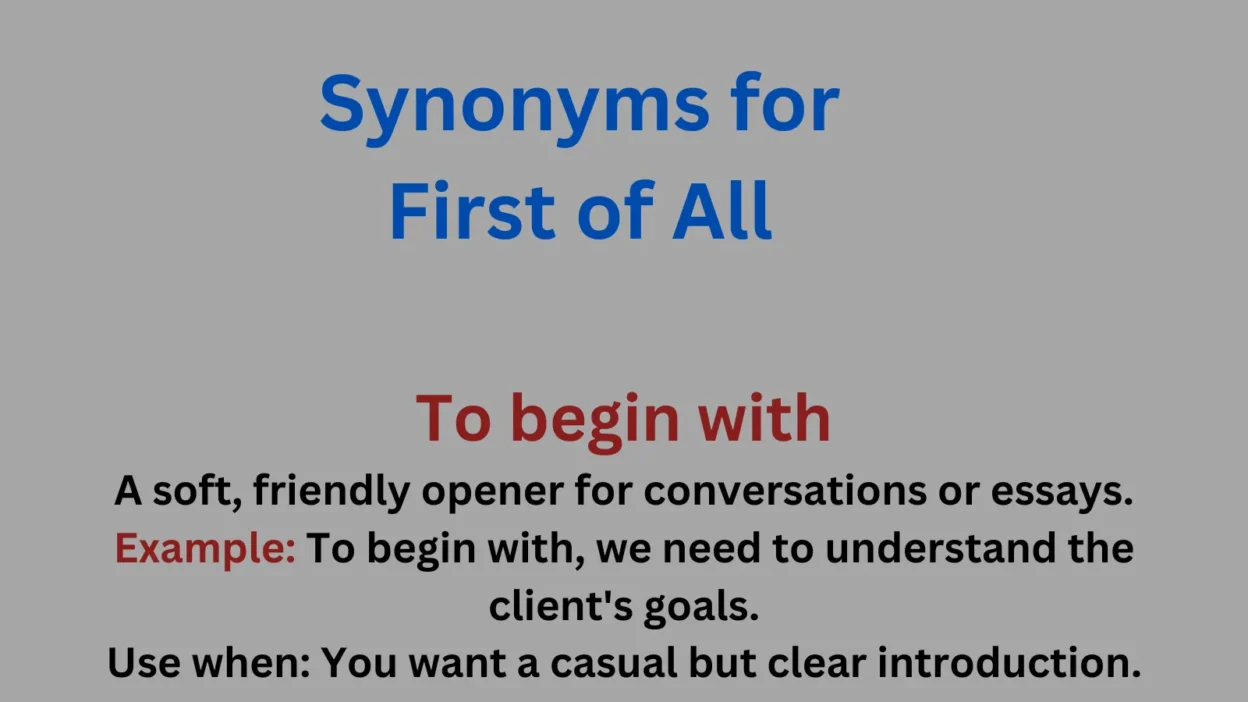Synonyms of first of all help you introduce your main point or start a sequence, such as to begin with, initially, or first and foremost. For example, First of all, I’d like to thank everyone for coming. Using the right synonym lets you open thoughts clearly and guide your reader or listener through a logical order. Each phrase adds a slightly different tone—formal, casual, or emphatic.
If you’re writing an essay, giving a speech, or making a list, choosing the perfect synonym for first of all sets the stage effectively.
In this article, you’ll get the meaning and example sentence for each synonym of first of all, so you can lead off with clarity and style. Ready to start strong? Let’s begin!
What Does First of All Mean?
At its core, “first of all” signals the beginning of a sequence. It’s a modest, organized way to introduce your primary idea, often with a slightly formal or courteous tone. It can feel a bit reserved, even shy, especially compared to more direct openers like “the main thing is” or “let’s get straight to the point.”
Use it when:
- You want to ease into a list.
- You’re being polite or methodical.
- You’re writing academically or professionally.
Now, let’s explore some powerful alternatives—each with a slightly different flavor.
30 Alternatives for First of All (with Examples & When to Use Them)
1. To begin with
A soft, friendly opener for conversations or essays.
Example: To begin with, we need to understand the client’s goals.
Use when: You want a casual but clear introduction.
2. Initially
More formal and often used in technical or analytical writing.
Example: Initially, the project seemed straightforward.
Use when: You’re discussing chronological order or first impressions.
3. At the outset
A polished, literary option for formal writing.
Example: At the outset, we agreed on mutual terms.
Use when: You’re setting a reflective or historical tone.
4. In the first place
Adds a subtle defensive tone—often used in arguments or debates.
Example: In the first place, we never approved that plan.
Use when: You’re justifying something.
5. Primarily
Focuses on importance, not just sequence.
Example: Primarily, we aim to reduce waste.
Use when: You’re stressing priority or core objectives.
6. First and foremost
Adds emphasis and clarity—stronger than “first of all.”
Example: First and foremost, we value integrity.
Use when: You want to sound firm and value-driven.
7. Let’s start with
Conversational and engaging.
Example: Let’s start with your most recent experience.
Use when: Speaking or writing informally.
8. First off
Casual, often heard in speech.
Example: First off, thanks for coming today.
Use when: You’re being friendly or informal.
9. First thing’s first
Playful, idiomatic, and slightly informal.
Example: First thing’s first—coffee.
Use when: You want to sound lighthearted or fun.
10. Originally
Works well for stories or narratives.
Example: Originally, we planned to launch in May.
Use when: Describing a past intention or timeline.
11. Before anything else
A little dramatic; emphasizes urgency.
Example: Before anything else, update your passwords.
Use when: Highlighting essential actions.
12. To kick things off
Lively and conversational.
Example: To kick things off, let’s look at the numbers.
Use when: Presenting or energizing your audience.
13. To get started
Simple and action-oriented.
Example: To get started, open the file on your desktop.
Use when: Giving instructions or starting a task.
14. To open with
Slightly creative—common in writing or storytelling.
Example: To open with a question—what does success mean to you?
Use when: Framing a narrative or speech.
15. As a starting point
Helpful for analytical or structured writing.
Example: As a starting point, let’s define the terms.
Use when: Laying a foundation for a discussion.
16. At first glance
Adds nuance or surprise.
Example: At first glance, it seems obvious—but it’s not.
Use when: Introducing a misleading first impression.
17. The first consideration
More formal, good for structured reasoning.
Example: The first consideration is safety.
Use when: Listing evaluative points.
18. Starting with
Direct and clear.
Example: Starting with the budget, let’s go through the plan.
Use when: Transitioning into sequential points.
19. To lead with
Professional and confident.
Example: To lead with an example, consider this case.
Use when: Framing your first idea assertively.
20. Right off the bat
Very casual and American.
Example: Right off the bat, I knew this wasn’t right.
Use when: Speaking colloquially.
21. Upfront
It can imply honesty or directness.
Example: Upfront, we should clarify expectations.
Use when: You’re being transparent or frank.
22. Let me start by saying
Polite and personal—good for speeches.
Example: Let me start by saying how grateful I am.
Use when: You’re being sincere or emotional.
23. Our initial focus
Corporate or business-friendly.
Example: Our initial focus was brand awareness.
Use when: Writing formally in strategy or reports.
24. Initially speaking
Less common, but refined.
Example: Initially speaking, there were a few concerns.
Use when: Wanting to sound introspective.
25. Chiefly
Emphasizes the importance of order.
Example: Chiefly, we aim to serve our users.
Use when: Highlighting main motives or values.
26. Mainly
Simple, no-frills.
Example: Mainly, we struggled with time.
Use when: Summarizing or condensing ideas.
27. In essence
Suggests you’re getting to the core idea.
Example: In essence, it’s about trust.
Use when: Providing a simplified or profound point.
28. Essentially
Similar to “in essence,” with a slightly casual tone.
Example: Essentially, we missed the mark.
Use when: Wrapping up an abstract idea simply.
29. At the beginning
Neutral, works in most contexts.
Example: At the beginning, there was doubt.
Use when: Telling a chronological story.
30. First out of the gate
An energetic, idiomatic phrase borrowed from horse racing, it emphasizes speed or early action.
Example: First out of the gate was the marketing team with a bold new campaign.
Use when: You want to highlight enthusiasm, competition, or early movers in a fast-paced context—great for business or sports discussions.
Conclusion
Using the right synonym for first of all can elevate your writing by making it more dynamic, professional, and easier to follow. Whether you choose to begin with, initially, firstly, or another alternative, each offers a unique tone and flow depending on your audience and context. This article has provided 30 clear options with meanings, examples, and usage tips to help you transition more smoothly.
By varying your transitions, you avoid repetition and keep your readers engaged from the very start. With these alternatives, you’ll be ready to lead into any topic with clarity, confidence, and style.
Keep experimenting with different expressions to match your tone and purpose. The right opening sets the stage for a more compelling message every time.




